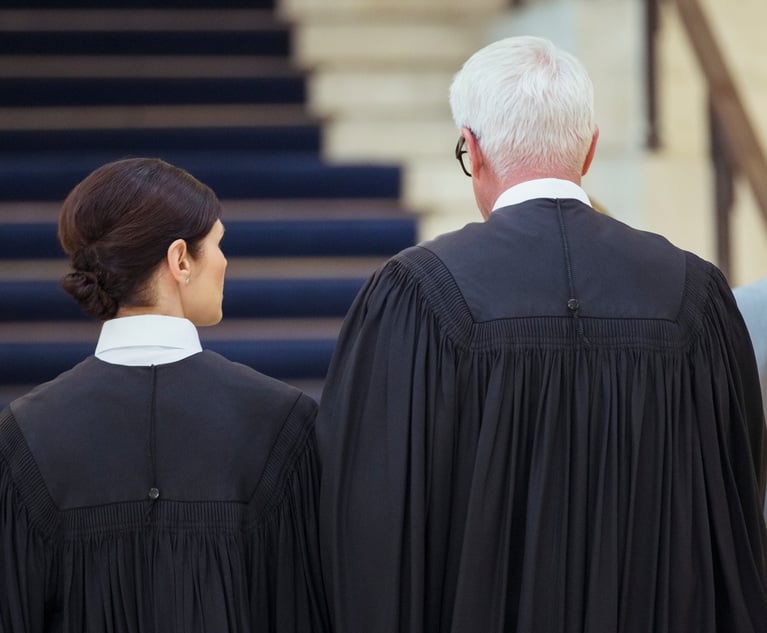Breyer Responds to Trump Calling Justice System 'Laughingstock'
"Obviously, I have a self- interest," Breyer said, adding, "I think we do pretty well."
November 05, 2017 at 11:55 AM
8 minute read
 Gail Evans (left) and Justice Stephen Breyer. (Photo: Heidi Morton)
Gail Evans (left) and Justice Stephen Breyer. (Photo: Heidi Morton)
Just after Justice Stephen Breyer sat down to discuss his book about the U.S. Supreme Court and the influence of world issues, his interviewer asked about ”the elephant in the room.”
What did he have to say about President Donald Trump's Nov. 1 statement that the U.S. justice system was “a laughingstock,” asked Gail Evans, a former CNN executive vice president.
“Obviously, I have a self-interest,” Breyer said to laughs from the 1,000 spectators at an Atlanta Jewish book festival Saturday night. But he added, “I think we do pretty well.”
Addressing the Halloween truck attack on a Manhattan bike path that killed eight people and injured nearly a dozen others, Trump had complained that terrorists were punished too lightly after years in court.
“We need quick justice and we need strong justice—much quicker and much stronger than we have right now. Because what we have right now is a joke and it's a laughingstock. And no wonder so much of this stuff takes place. And I think I can speak for plenty of other countries, too, that are in the same situation,” Trump added, according to a White House transcript.
Breyer told Evans she'd have to ask people in other countries what they thought of the U.S. justice system, but he lauded places where citizens are “willing to resolve their differences under the law.”
He used Bush v. Gore as an example. Half the country hated the decision that effectively made George W. Bush the winner of the 2000 presidential election, but “in any case, they followed it,” he said.
Despite being one of the four justices who dissented from the ruling, he urged anyone who thought the ruling should not have been accepted to look at how countries have fared when people don't accept rule of law.
As for the U.S. system, he said, “It's always a work in progress.”
The event was focused on Breyer's 2015 book, “The Court and the World: American Law and the New Global Realities.”
Breyer said there has been a sharp increase in high court cases where the justices have to reconcile U.S. law with those from other countries. He noted that the U.S. is party to more than 850 treaties, monitored by organizations that bind more than one nation to its rules. Working with other countries and their laws is the only way international airlines and a host of other industries can operate, he added.
Foreign law and customs are important in understanding cases involving antitrust and copyright issues and how countries balance national security and civil liberties. But he emphasized that foreign law doesn't control what the Supreme Court decides.
He pointed to his dissent in a 2015 case upholding a death sentence in which he concluded it was “highly likely that the death penalty violates the Eighth Amendment” and called on the court to ask for a full briefing on the question.
Breyer said that, in only two of the 45 pages he wrote in the dissent, he addressed how other countries handled the death penalty. “I didn't think that was determinative,” he added, pointing readers to the other 43 pages concerning U.S. law.
Breyer remarked on the court's collegiality even when the justices disagree, saying, “I've never heard a voice raised in anger” in the court's conference meetings. Debates, he said, are calm and professional.
He also credited retired Justice David Souter's memory for “inoffensive jokes”—and shared one: At 5 p.m. one winter day a man runs from the Boston Common to a dentist's office. The office is closing, the receptionist said, but the man insists he must see the doctor. “It's an emergency,” he pleads.
The dentist agrees to see the man and asks what the emergency is.
“I think I am a moth,” the man says.
“I'm a dentist. You need to see a psychiatrist. Why'd you come here?”
The man replies, “The light was on.”
 Gail Evans (left) and Justice Stephen Breyer. (Photo: Heidi Morton)
Gail Evans (left) and Justice Stephen Breyer. (Photo: Heidi Morton)
Just after Justice Stephen Breyer sat down to discuss his book about the U.S. Supreme Court and the influence of world issues, his interviewer asked about ”the elephant in the room.”
What did he have to say about President Donald Trump's Nov. 1 statement that the U.S. justice system was “a laughingstock,” asked Gail Evans, a former CNN executive vice president.
“Obviously, I have a self-interest,” Breyer said to laughs from the 1,000 spectators at an Atlanta Jewish book festival Saturday night. But he added, “I think we do pretty well.”
Addressing the Halloween truck attack on a Manhattan bike path that killed eight people and injured nearly a dozen others, Trump had complained that terrorists were punished too lightly after years in court.
“We need quick justice and we need strong justice—much quicker and much stronger than we have right now. Because what we have right now is a joke and it's a laughingstock. And no wonder so much of this stuff takes place. And I think I can speak for plenty of other countries, too, that are in the same situation,” Trump added, according to a White House transcript.
Breyer told Evans she'd have to ask people in other countries what they thought of the U.S. justice system, but he lauded places where citizens are “willing to resolve their differences under the law.”
He used Bush v. Gore as an example. Half the country hated the decision that effectively made George W. Bush the winner of the 2000 presidential election, but “in any case, they followed it,” he said.
Despite being one of the four justices who dissented from the ruling, he urged anyone who thought the ruling should not have been accepted to look at how countries have fared when people don't accept rule of law.
As for the U.S. system, he said, “It's always a work in progress.”
The event was focused on Breyer's 2015 book, “The Court and the World: American Law and the New Global Realities.”
Breyer said there has been a sharp increase in high court cases where the justices have to reconcile U.S. law with those from other countries. He noted that the U.S. is party to more than 850 treaties, monitored by organizations that bind more than one nation to its rules. Working with other countries and their laws is the only way international airlines and a host of other industries can operate, he added.
Foreign law and customs are important in understanding cases involving antitrust and copyright issues and how countries balance national security and civil liberties. But he emphasized that foreign law doesn't control what the Supreme Court decides.
He pointed to his dissent in a 2015 case upholding a death sentence in which he concluded it was “highly likely that the death penalty violates the Eighth Amendment” and called on the court to ask for a full briefing on the question.
Breyer said that, in only two of the 45 pages he wrote in the dissent, he addressed how other countries handled the death penalty. “I didn't think that was determinative,” he added, pointing readers to the other 43 pages concerning U.S. law.
Breyer remarked on the court's collegiality even when the justices disagree, saying, “I've never heard a voice raised in anger” in the court's conference meetings. Debates, he said, are calm and professional.
He also credited retired Justice David Souter's memory for “inoffensive jokes”—and shared one: At 5 p.m. one winter day a man runs from the Boston Common to a dentist's office. The office is closing, the receptionist said, but the man insists he must see the doctor. “It's an emergency,” he pleads.
The dentist agrees to see the man and asks what the emergency is.
“I think I am a moth,” the man says.
“I'm a dentist. You need to see a psychiatrist. Why'd you come here?”
The man replies, “The light was on.”
This content has been archived. It is available through our partners, LexisNexis® and Bloomberg Law.
To view this content, please continue to their sites.
Not a Lexis Subscriber?
Subscribe Now
Not a Bloomberg Law Subscriber?
Subscribe Now
NOT FOR REPRINT
© 2025 ALM Global, LLC, All Rights Reserved. Request academic re-use from www.copyright.com. All other uses, submit a request to [email protected]. For more information visit Asset & Logo Licensing.
You Might Like
View All

Spalding Jurors Return $12M Verdict Against State Farm Insurance Client
10 minute read

Trending Stories
- 1Courts, Lawyers Press On With Business as SoCal Wildfires Rage
- 2Florida, a Political Epicenter, Is the Site of Brownstein Hyatt's 13th Office
- 3Law Firms Close Southern California Offices Amid Devastating Wildfires
- 4Lawsuit alleges racial and gender discrimination led to an Air Force contractor's death at California airfield
- 5Holland & Knight Picks Up 8 Private Wealth Lawyers in Los Angeles
Who Got The Work
Michael G. Bongiorno, Andrew Scott Dulberg and Elizabeth E. Driscoll from Wilmer Cutler Pickering Hale and Dorr have stepped in to represent Symbotic Inc., an A.I.-enabled technology platform that focuses on increasing supply chain efficiency, and other defendants in a pending shareholder derivative lawsuit. The case, filed Oct. 2 in Massachusetts District Court by the Brown Law Firm on behalf of Stephen Austen, accuses certain officers and directors of misleading investors in regard to Symbotic's potential for margin growth by failing to disclose that the company was not equipped to timely deploy its systems or manage expenses through project delays. The case, assigned to U.S. District Judge Nathaniel M. Gorton, is 1:24-cv-12522, Austen v. Cohen et al.
Who Got The Work
Edmund Polubinski and Marie Killmond of Davis Polk & Wardwell have entered appearances for data platform software development company MongoDB and other defendants in a pending shareholder derivative lawsuit. The action, filed Oct. 7 in New York Southern District Court by the Brown Law Firm, accuses the company's directors and/or officers of falsely expressing confidence in the company’s restructuring of its sales incentive plan and downplaying the severity of decreases in its upfront commitments. The case is 1:24-cv-07594, Roy v. Ittycheria et al.
Who Got The Work
Amy O. Bruchs and Kurt F. Ellison of Michael Best & Friedrich have entered appearances for Epic Systems Corp. in a pending employment discrimination lawsuit. The suit was filed Sept. 7 in Wisconsin Western District Court by Levine Eisberner LLC and Siri & Glimstad on behalf of a project manager who claims that he was wrongfully terminated after applying for a religious exemption to the defendant's COVID-19 vaccine mandate. The case, assigned to U.S. Magistrate Judge Anita Marie Boor, is 3:24-cv-00630, Secker, Nathan v. Epic Systems Corporation.
Who Got The Work
David X. Sullivan, Thomas J. Finn and Gregory A. Hall from McCarter & English have entered appearances for Sunrun Installation Services in a pending civil rights lawsuit. The complaint was filed Sept. 4 in Connecticut District Court by attorney Robert M. Berke on behalf of former employee George Edward Steins, who was arrested and charged with employing an unregistered home improvement salesperson. The complaint alleges that had Sunrun informed the Connecticut Department of Consumer Protection that the plaintiff's employment had ended in 2017 and that he no longer held Sunrun's home improvement contractor license, he would not have been hit with charges, which were dismissed in May 2024. The case, assigned to U.S. District Judge Jeffrey A. Meyer, is 3:24-cv-01423, Steins v. Sunrun, Inc. et al.
Who Got The Work
Greenberg Traurig shareholder Joshua L. Raskin has entered an appearance for boohoo.com UK Ltd. in a pending patent infringement lawsuit. The suit, filed Sept. 3 in Texas Eastern District Court by Rozier Hardt McDonough on behalf of Alto Dynamics, asserts five patents related to an online shopping platform. The case, assigned to U.S. District Judge Rodney Gilstrap, is 2:24-cv-00719, Alto Dynamics, LLC v. boohoo.com UK Limited.
Featured Firms
Law Offices of Gary Martin Hays & Associates, P.C.
(470) 294-1674
Law Offices of Mark E. Salomone
(857) 444-6468
Smith & Hassler
(713) 739-1250






